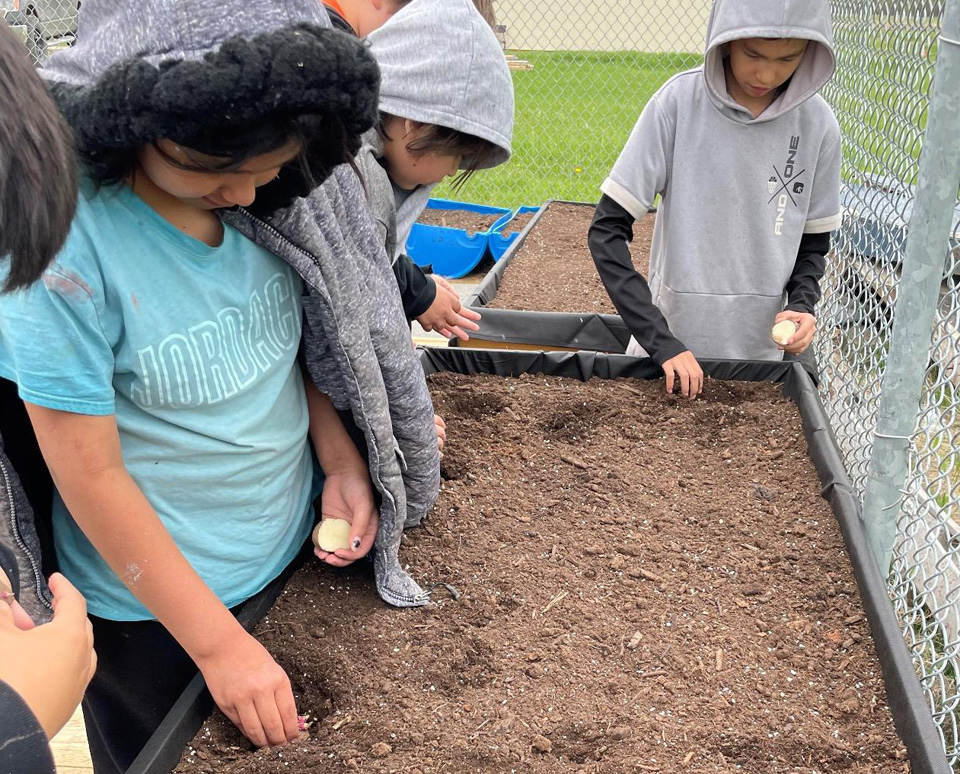Photo: Paul Lavoie
Two schools in Alberta’s Peace Region are benefiting from a pilot project to establish and grow farm to school in the region in the 2022/23 school year. This project is a collaboration between Alberta Food Matters and Alberta Public Health Association, in partnership with the Public Health Association of BC, the Rural Development Network, and Farm to Cafeteria Canada.
Farm to school programs are designed to help students access healthy local food at school, engage in hands-on food literacy, and make connections in their local community. Programs are unique in each community, and they often begin with an idea supported by a passionate group of parents, educators, farmers and other members of the community who are dedicated to helping it come to life.

While these individuals are essential to generating momentum, programs can really flourish when a paid position is dedicated to helping the vision become reality. That’s where a new role being piloted in 2 Northern Alberta schools comes into play. The position known as the “Community School Food Animator” is the first of its kind in Alberta and is based on the Farm to School BC program which was established by a project partner, Public Health Association of BC (PHABC), in nextdoor British Columbia.
In addition to knowledge and skills brought to the table by the project partners, the Community School Food Animator pilot is made possible with funding support from the provincial government’s Community Initiatives Program. The goal is to implement and evaluate a paid position that links schools to their communities using a Farm to School Approach to generate positive impacts across 4 impact areas: public health, education, community economic development and the environment.
-
Students win because they can access and learn about healthy food and food systems
-
Teachers win because they can access resources and support to bring their lesson plans to life through food
-
Farmers and other local food providers win by making connections to local schools and families
-
The planet wins because students learn to understand and value sustainable food systems
The Animator role is being filled by the dynamic duo, Amy Soudek and Christine Findlay, behind ONE Nutrition and Health who began in the role in September 2022. Amy and Christine are working with T.A. Norris Middle School in Peace River and Manning Elementary in Manning. T.A. Norris has a $3,000 grant from Alberta Blue Cross to put in a raised bed garden, and Manning Elementary has received a $10,000 grant from Farm to Cafeteria Canada to establish a comprehensive farm to school program, which includes building upon the infrastructure they already have in place (like a greenhouse) and incorporating a meal service. A couple of the ways Amy and Christine are mentoring the schools include helping educators make connections between food systems and the curriculum, and engaging essential community partners like farmers and other local food producers. The Animator support is intended to help schools set and work toward realistic food literacy and food service goals in a way that feels manageable and helps lighten the load on educators and parent volunteers who may otherwise take this on in a ‘volunteer’ capacity, which can be difficult to sustain.

When it comes to farm to school, goals and activities look different in each school… but what they have in common is getting more healthy, local food on the minds and plates of students. In the case of T.A. Norris and Manning Elementary, school gardening and teaching where food comes from have been identified as a focus during the year ahead, but specific goals for each school will be directed by the students themselves. We can’t wait to follow along on the journey for these two schools. Key learnings from this project will provide important insights to inform how the Animator role can be adapted and applied in other regions of Alberta, with the hope of being able to grow the model province-wide.
Farm to school activities can start small – there is always time and room to grow! If you would like to learn more about farm to school and how to get started, check out the Farm to School Resource Centre.




